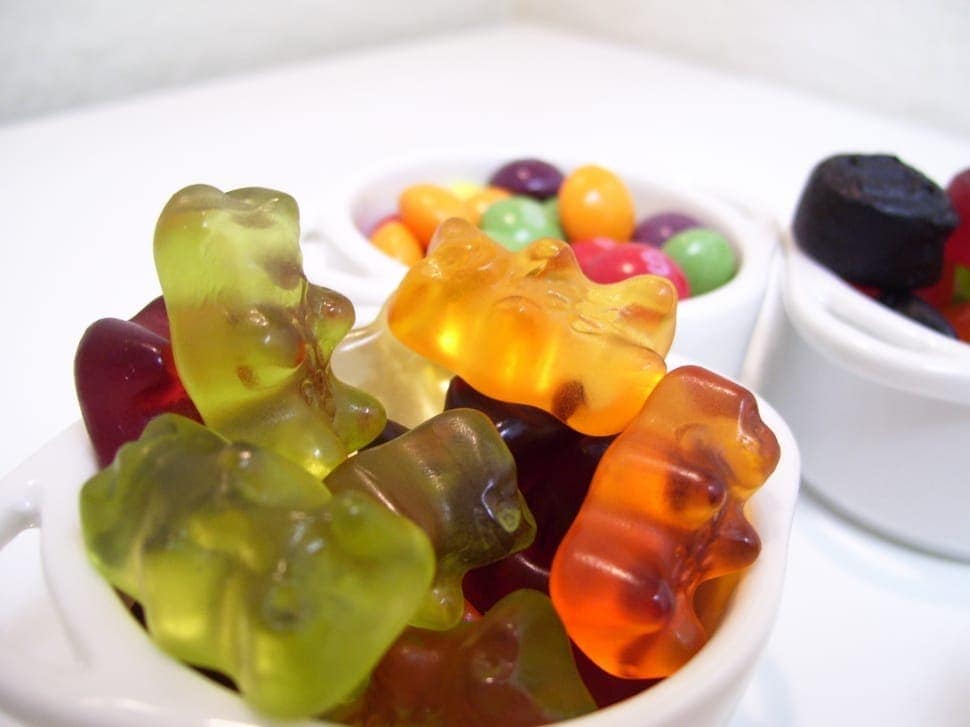Can Dogs Eat Gummy Bears? Are Gummy Bears Safe for Dogs?

Updated on

Gummy Bears are a fruity candy found in many homes with small children. Because they are so prevalent, you may be wondering if it is okay to feed them to your pet. The quick answer is no. It would be best if you did not feed your pet gummy bears for various reasons that we will discuss below.
Join us while we look at the harmful side effects that can occur as a result of feeding your dog gummy bears and if there are positive aspects to this sweet treat.
Are Gummy Bears Bad for My Dog?
We said you should not feed gummy bears to your dog, so let’s look at a few reasons why.
Xylitol
The biggest concern when feeding your pet a gummy bear is whether it contains an artificial sweetener named xylitol. Even a tiny amount of this chemical can cause an extreme reaction in your dog, resulting in death. Xylitol causes the pancreas to release an excess of insulin, which removes the sugar from the blood and causes a condition known as hypoglycemia.
The signs of xylitol poison begin to appear within 15 to 30 minutes and include vomiting, weakness, tremors, lack of coordination, and difficulty walking. If your dog ingests xylitol accidentally, we recommend immediately calling a veterinarian or poison control.
Sugar
If your gummy bears do not contain Xylitol, it’s unlikely that eating a few will be life-threatening. However, there is little more than gelatin and sugar in the ingredients, and it is a treat that can still lead to obesity and raised sugar levels. Too much sugar over an extended period can also lead to other conditions like diabetes that can dramatically shorten your pet’s life.
Choking Hazard
Another problem you will need to worry about if you feed your dog a regular diet of gummy bears is that they may present a choking hazard. Their small size can easily get lodged in the teeth and throat of your pet.

Are Gummy Bears Good for My Dog?
As we mentioned, there is very little in a gummy bear besides gelatin and sugar or xylitol, so there is no nutritional benefit in feeding them to your pet. There is some evidence that gelatin can help ease joint pain, but you will not feed enough to your pet to see a benefit in this area.
How Can I Feed Gummy Bears to My Dog?
Since we don’t recommend feeding your pet any store-bought brand of gummy bear, we found a recipe you can make at home. We found the perfect recipe at Fluffy Planet that allows you to create a safe gummy treat for your pet in just a few steps.
Gummy Treat for Dogs
Ingredients
- ½ cup broth, preferably bone broth
- One envelope of gelatin
- Half a beet
- 3-4 strawberries
- Handful of parsley
Instructions
Fluffy Planet also suggests substituting coconut water for broth. You can substitute almost any fruit for strawberries to get a wide range of flavors. These treats should last 10 days or more and are much healthier and tastier than the kind you buy in the store.
There is no sugar and no xylitol, while the strawberries, beets, and parsley provide essential nutrients. You can cut squares or shapes as large as you need, so there is much less chance that your gelatin treats will be a choking hazard.

Summary
The primary danger of giving your dog gummy bears or other sugary candies lies in the xylitol that they may contain. Since many gummy bears contain xylitol, they’re included in lists of the most dangerous foods to give your dog. It only takes a small portion of gummy bears with xylitol to produce an adverse reaction that requires an emergency visit to the veterinarian. However, they will be fine if they eat a few that do not contain xylitol. We recommend researching and avoiding bringing foods home that contain xylitol.
See also:
- Can Dogs Eat Skittles? Are Skittles Safe for Dogs?
- Can Dogs Eat Black and Red Licorice? Are Black and Red Licorice Safe for Dogs?
Featured Image Credit: Alexas_Fotos, Pixabay











